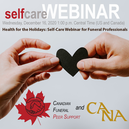|
We at CANA hope that you find this resource useful. Thank you for the work you do to serve our families, our friends, and our communities everyday.
Peer Support Meeting
Third Tuesday of Each Month Next Meeting: Tuesday, August 20, 2024 Time: 8pm ET / 7pm CT / 5pm PT |
|
|
|
Join a MeetingEvery third Tuesday, CANA hosts a meeting from Funeral Professionals Peer Support. These meetings are open to anyone who serves their communities during some of their worst moments, providing care to the grieving. That includes everyone from the front office to the back room, chapel to gravesite, suited to coveralls — and everyone in-between. As a peer support meeting, all are invited to share personal experiences and connect with people who understand what you experience everyday.
|
|
Let me ask you a few therapeutic questions in the language of making this specifically for you and about you. This is where we start, because, like the funeral vehicles we drive, if we don’t keep ourselves fuelled, we cannot function. We do have limits and cannot run on empty. We risk shutting down in an effort to conserve our limited emotional, physical and intrapsychic energy. Read more...
|
|
It’s essential to remember that caregivers need someone to care for and listen to them. Not only do we navigate the emotion and reality that death brings to the families that we serve, but we also deal with the day-to-day struggles of the workplace, life outside the office, family, our own personal struggles and emotions. Work-life balance takes on new meaning as we try to not let the personal interfere with the lifepath that has chosen us in the death care industry. Read more...
|
|
I could imagine the funeral director I had shadowed that day going to a barbeque with a group of friends later that night. While the accountant could complain about the stress of tax season and the teacher could share stories about unruly children and disgruntled parents, he already knew that no one wanted to hear about his day at the funeral home. Even his spouse would not want to hear the details of his day. And so, he would have to keep it inside – like the thousands of other funeral and cemetery professionals who perform the same duties each day. Read more...
|
|
From that point on, I decided to not be quiet, but to be very open about my diagnosis. When I told my colleagues what I was dealing with, many of them said “Man, I am going through the same thing. I am tired, frustrated, and burnt out and I am thinking of leaving.” So, instead of staying quiet and only worrying about me, I reached out to a few friends and we decided to come together and organize the very first funeral service peer support group in the world. Read more...
|
|
Bereavement professionals such as funeral directors, embalmers, cemetery workers, crematorium operators, and their support staff may regularly engage with diverse, potentially psychologically traumatic events. These exposures can lead to a variety of mental health injuries, including post-traumatic stress disorder, major depressive disorder, panic disorder, and alcohol use disorder. Recent research has provided important information about those experiences, such as the scope of the challenges, the potential impacts on mental health, factors impacting health, and some of the opportunities to help protect mental health and provide support. Read more...
|
|
Funeral professionals have a challenging job under normal circumstances; these are not normal circumstances. Covid-19 has simply turned the world upside down. As a psychologist who works with funeral homes and also works in one, I want to offer several suggestions for dealing with the additional stress created by the current epidemic. Read more...
|


|
